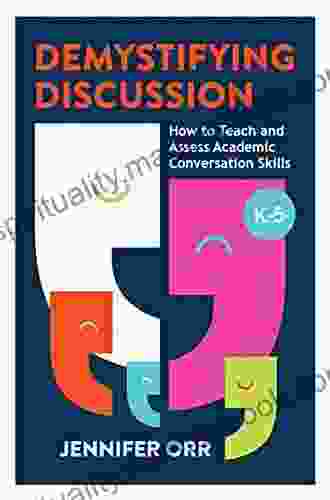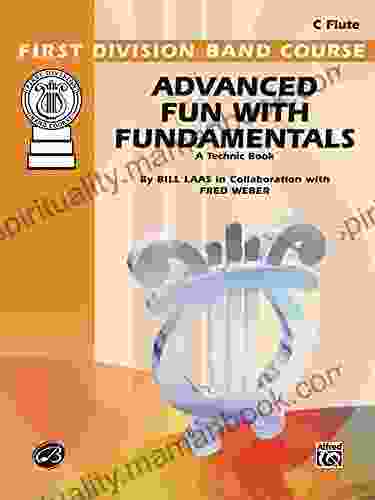How to Effectively Teach and Assess Academic Conversation Skills: A Comprehensive Guide

Academic conversation skills are essential for students' success in higher education. They allow students to participate effectively in class discussions, collaborate with peers on projects, and present their ideas clearly and coherently. However, teaching and assessing academic conversation skills can be a challenge for educators.
4.6 out of 5
| Language | : | English |
| File size | : | 1088 KB |
| Text-to-Speech | : | Enabled |
| Screen Reader | : | Supported |
| Enhanced typesetting | : | Enabled |
| Word Wise | : | Enabled |
| Print length | : | 237 pages |
This guide will provide you with everything you need to know about teaching and assessing academic conversation skills. We will cover:
- The importance of academic conversation skills
- Strategies for teaching academic conversation skills
- Rubrics for assessing academic conversation skills
- Tips for fostering a positive learning environment
The Importance of Academic Conversation Skills
Academic conversation skills are important for several reasons. First, they allow students to participate effectively in class discussions. When students can engage in meaningful conversation with their peers, they are more likely to learn from the experience. They can share their own ideas, challenge the ideas of others, and come to a deeper understanding of the material.
Second, academic conversation skills are essential for collaboration. In today's workplace, employees are expected to be able to work effectively in teams. This requires being able to communicate clearly and respectfully, to share ideas, and to come to consensus. Academic conversation skills provide students with the foundation they need to be successful in collaborative environments.
Finally, academic conversation skills are important for presenting ideas clearly and coherently. Students need to be able to present their ideas in a way that is easy for others to understand. This requires being able to organize their thoughts, to use clear and concise language, and to speak with confidence. Academic conversation skills provide students with the skills they need to be effective presenters.
Strategies for Teaching Academic Conversation Skills
There are a number of strategies that you can use to teach academic conversation skills. Some of the most effective strategies include:
- Modeling: One of the best ways to teach academic conversation skills is to model them yourself. When you are leading class discussions, be sure to speak clearly and respectfully. Share your own ideas, challenge the ideas of others, and come to a consensus. By modeling good academic conversation skills, you can show students what they should strive for.
- Role-playing: Role-playing is a great way for students to practice academic conversation skills in a safe and supportive environment. You can assign students different roles, such as the presenter, the challenger, or the consensus builder. This will give them an opportunity to practice different aspects of academic conversation.
- Small group discussions: Small group discussions are another great way for students to practice academic conversation skills. In small groups, students can share their ideas, challenge each other's ideas, and come to a consensus. This can help them develop their confidence and their ability to speak in front of others.
- Peer feedback: Peer feedback can be a valuable tool for helping students improve their academic conversation skills. When students give each other feedback, they can identify areas where they can improve. This can help them develop their self-awareness and their ability to reflect on their own performance.
Rubrics for Assessing Academic Conversation Skills
Once you have taught academic conversation skills, you need to be able to assess them. This will help you to track student progress and to provide feedback. There are a number of different rubrics that you can use to assess academic conversation skills. Some of the most common criteria include:
- Clarity: Students should be able to speak clearly and concisely. They should be able to organize their thoughts and to use appropriate language.
- Respect: Students should be respectful of the opinions of others. They should be able to listen to others without interrupting and to challenge ideas in a respectful way.
- Collaboration: Students should be able to work effectively with others. They should be able to share ideas, to come to consensus, and to resolve conflict.
- Confidence: Students should be able to speak with confidence. They should be able to express their ideas clearly and to defend them against challenge.
Tips for Fostering a Positive Learning Environment
In order to effectively teach and assess academic conversation skills, you need to create a positive learning environment. This means creating a space where students feel safe, respected, and supported. Here are a few tips:
- Set clear expectations: At the beginning of the semester, be sure to set clear expectations for academic conversation skills. This will help students to understand what is expected of them.
- Provide regular feedback: As students develop their academic conversation skills, be sure to provide them with regular feedback. This will help them to track their progress and to identify areas where they can improve.
- Be patient: Learning academic conversation skills takes time. Be patient with students as they develop their skills.
- Create a safe space: Students need to feel safe in order to take risks and to learn from their mistakes. Create a safe space where students feel comfortable speaking up and sharing their ideas.
- Be respectful: Always be respectful of students' opinions, even if you don't agree with them. This will help to create a positive learning environment where students feel valued and respected.
Teaching and assessing academic conversation skills is an essential part of higher education. By following the strategies and tips outlined in this guide, you can create a positive learning environment where students can develop the skills they need to succeed in the classroom, in the workplace, and in life.
4.6 out of 5
| Language | : | English |
| File size | : | 1088 KB |
| Text-to-Speech | : | Enabled |
| Screen Reader | : | Supported |
| Enhanced typesetting | : | Enabled |
| Word Wise | : | Enabled |
| Print length | : | 237 pages |
Do you want to contribute by writing guest posts on this blog?
Please contact us and send us a resume of previous articles that you have written.
 Top Book
Top Book Novel
Novel Fiction
Fiction Nonfiction
Nonfiction Literature
Literature Paperback
Paperback Hardcover
Hardcover E-book
E-book Audiobook
Audiobook Bestseller
Bestseller Classic
Classic Mystery
Mystery Thriller
Thriller Romance
Romance Fantasy
Fantasy Science Fiction
Science Fiction Biography
Biography Memoir
Memoir Autobiography
Autobiography Poetry
Poetry Drama
Drama Historical Fiction
Historical Fiction Self-help
Self-help Young Adult
Young Adult Childrens Books
Childrens Books Graphic Novel
Graphic Novel Anthology
Anthology Series
Series Encyclopedia
Encyclopedia Reference
Reference Guidebook
Guidebook Textbook
Textbook Workbook
Workbook Journal
Journal Diary
Diary Manuscript
Manuscript Folio
Folio Pulp Fiction
Pulp Fiction Short Stories
Short Stories Fairy Tales
Fairy Tales Fables
Fables Mythology
Mythology Philosophy
Philosophy Religion
Religion Spirituality
Spirituality Essays
Essays Critique
Critique Commentary
Commentary Glossary
Glossary Bibliography
Bibliography Index
Index Table of Contents
Table of Contents Preface
Preface Introduction
Introduction Foreword
Foreword Afterword
Afterword Appendices
Appendices Annotations
Annotations Footnotes
Footnotes Epilogue
Epilogue Prologue
Prologue Peter Brady
Peter Brady Maxine Thompson
Maxine Thompson Rhonda Lee Carver
Rhonda Lee Carver Adrian Van Young
Adrian Van Young James Tate
James Tate Spencer Quinn
Spencer Quinn Zorana Ercegovac
Zorana Ercegovac Upile Chisala
Upile Chisala Sabine Kranich
Sabine Kranich Jane Kirkpatrick
Jane Kirkpatrick Adrian Kempton
Adrian Kempton Brian White
Brian White Jacques Leslie
Jacques Leslie Peter Loan
Peter Loan Dana Atkinson
Dana Atkinson Adrian Ernesto Cepeda
Adrian Ernesto Cepeda Mr Joseph Hogue
Mr Joseph Hogue Nicola Mar
Nicola Mar Steve Johnson
Steve Johnson Robert A Fox
Robert A Fox
Light bulbAdvertise smarter! Our strategic ad space ensures maximum exposure. Reserve your spot today!

 Joseph HellerSouth Riding Virago Modern Classics 28: A Profound Exploration of the British...
Joseph HellerSouth Riding Virago Modern Classics 28: A Profound Exploration of the British... Marcel ProustFollow ·8.2k
Marcel ProustFollow ·8.2k Pete BlairFollow ·3.6k
Pete BlairFollow ·3.6k Matthew WardFollow ·17.1k
Matthew WardFollow ·17.1k Oscar BellFollow ·7.2k
Oscar BellFollow ·7.2k Sidney CoxFollow ·6.6k
Sidney CoxFollow ·6.6k DeShawn PowellFollow ·13.1k
DeShawn PowellFollow ·13.1k Vince HayesFollow ·5.1k
Vince HayesFollow ·5.1k Harold PowellFollow ·16.2k
Harold PowellFollow ·16.2k

 Thomas Powell
Thomas PowellHair Care Essentials for Crochet Braids: A Protective...
Crochet braids are a versatile and...

 Philip Bell
Philip BellNative Nations of North America: A Comprehensive Guide
North America is home to a...

 Jackson Hayes
Jackson HayesCall Me Crazy: My Unique Journey with Green
In the kaleidoscopic tapestry of life, where...

 Graham Blair
Graham BlairUnveiling the Literary Treasures of Michigan: A Journey...
The literary landscape of...
4.6 out of 5
| Language | : | English |
| File size | : | 1088 KB |
| Text-to-Speech | : | Enabled |
| Screen Reader | : | Supported |
| Enhanced typesetting | : | Enabled |
| Word Wise | : | Enabled |
| Print length | : | 237 pages |














